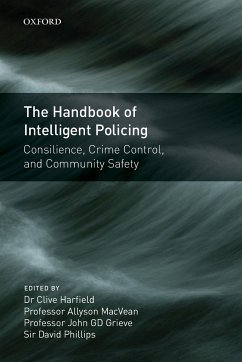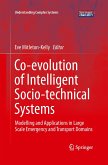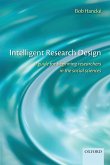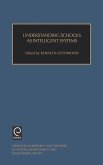- Broschiertes Buch
- Merkliste
- Auf die Merkliste
- Bewerten Bewerten
- Teilen
- Produkt teilen
- Produkterinnerung
- Produkterinnerung
This edited volume sets out, in a range of essays from leading experts and practitioners, the main concepts and philosophies behind the practical framework for intelligence gathering and analysis in UK policing. It is the first of its kind to give the theoretical context of current police practice across a wide range of intelligence-related areas.
Andere Kunden interessierten sich auch für
![Intelligent Network Video Intelligent Network Video]() Fredrik NilssonIntelligent Network Video96,99 €
Fredrik NilssonIntelligent Network Video96,99 €![Intelligent Materialism Intelligent Materialism]() Evald IlyenkovIntelligent Materialism188,99 €
Evald IlyenkovIntelligent Materialism188,99 €![Co-evolution of Intelligent Socio-technical Systems Co-evolution of Intelligent Socio-technical Systems]() Co-evolution of Intelligent Socio-technical Systems110,99 €
Co-evolution of Intelligent Socio-technical Systems110,99 €![INTELLIGENT RESEARCH DESIGN INTELLIGENT RESEARCH DESIGN]() HanckeINTELLIGENT RESEARCH DESIGN52,99 €
HanckeINTELLIGENT RESEARCH DESIGN52,99 €![Understanding Schools as Intelligent Systems Understanding Schools as Intelligent Systems]() G.M. Crow / K. Leithwood (eds.)Understanding Schools as Intelligent Systems215,99 €
G.M. Crow / K. Leithwood (eds.)Understanding Schools as Intelligent Systems215,99 €![The SAGE Handbook of Social Studies in Health and Medicine The SAGE Handbook of Social Studies in Health and Medicine]() The SAGE Handbook of Social Studies in Health and Medicine144,99 €
The SAGE Handbook of Social Studies in Health and Medicine144,99 €![The SAGE Handbook of Digital Society The SAGE Handbook of Digital Society]() The SAGE Handbook of Digital Society125,99 €
The SAGE Handbook of Digital Society125,99 €-
-
-
This edited volume sets out, in a range of essays from leading experts and practitioners, the main concepts and philosophies behind the practical framework for intelligence gathering and analysis in UK policing. It is the first of its kind to give the theoretical context of current police practice across a wide range of intelligence-related areas.
Hinweis: Dieser Artikel kann nur an eine deutsche Lieferadresse ausgeliefert werden.
Hinweis: Dieser Artikel kann nur an eine deutsche Lieferadresse ausgeliefert werden.
Produktdetails
- Produktdetails
- Verlag: OUP UK
- Seitenzahl: 340
- Erscheinungstermin: 1. Oktober 2008
- Englisch
- Abmessung: 234mm x 156mm x 19mm
- Gewicht: 518g
- ISBN-13: 9780199533121
- ISBN-10: 0199533121
- Artikelnr.: 24764873
- Herstellerkennzeichnung
- Produktsicherheitsverantwortliche/r
- Europaallee 1
- 36244 Bad Hersfeld
- gpsr@libri.de
- Verlag: OUP UK
- Seitenzahl: 340
- Erscheinungstermin: 1. Oktober 2008
- Englisch
- Abmessung: 234mm x 156mm x 19mm
- Gewicht: 518g
- ISBN-13: 9780199533121
- ISBN-10: 0199533121
- Artikelnr.: 24764873
- Herstellerkennzeichnung
- Produktsicherheitsverantwortliche/r
- Europaallee 1
- 36244 Bad Hersfeld
- gpsr@libri.de
Professor John Grieve QPM is Professor Emeritus and Chair of the John Grieve Centre for Policing at London Metropolitan University, and a former Director of Intelligence for the Metropolitan Police. Professor Allyson McVean is Director and Founder of the John Grieve Centre for Policing and Community Safety, London Metropolitan University. She has extensive practical experience of working with police forces on issues of dangerous offender management and community impact assessments, and thus brings a third party perspective to the partnership use of intelligence. Dr Clive Harfield is Deputy Director of the John Grieve Centre for Policing and Community Safety and a police commander and national intelligence officer. Dr Harfield is co-author of two Blackstone's Practical Policing titles, Covert Investigation and Intelligence. Sir David Phillips is Director of the National Centre of Policing Excellence and former Chief Constable of Kent Police. He was knighted in 2000 for his services to policing and is an honorary fellow of Christ Church, University of Oxford. Sir David is best known for his development of 'intelligence led' policing, his contributions to criminal justice reform and his advocacy of professional skills in investigation. He was a member of the Criminal Justice Council by appointment of the Lord Chancellor.
* I- The development of thinking about police intelligence
* Introduction to Part 1: Ideas in police intelligence
* 1: John Grieve QPM: Lawfully Audacious: A reflective journey
* 2: Sir David Phillips: Police Intelligent Systems as a Strategic
Response
* 3: Dick Kerr: The Perfect Enemy - Reflections of an Intelligence
Officer on the Cold War and Today's Challenges
* 4: Frank Gregory: The police and the intelligence services: with
special reference to the relationship with MI5
* 5: Allyson MacVean: The Governance of Intelligence
* 6: Kalbir Sohi and Clive Harfield: "Intelligence" and the Division of
Linguistic Labour
* II- Analysis: Providing a Context for Intelligence
* Introduction to Part 2: Analysis - Providing a Context for
Intelligence
* 7: Allyson MacVean and Clive Harfield: Science or sophistry: issues
in managing analysts and their products
* 8: R.Mark Evans: Cultural Paradigms and Change: A Model of Analysis
* 9: Jacqueline Sissens: 'An evaluation of the role of the Intelligence
Analyst within the National Intelligence Model.'
* 10: Nick Ridley: Pan-European law enforcement strategic analysis:
trends and concerns
* III- Case studies: Intelligence and Partnership
* Part 3 - Case Studies: Intelligence and Partnership
* 11: Sarah Lewis: Intelligent partnership
* 12: Laura Juett, Rebecca Smith and John Grieve: Open Source
Intelligence - a case study GLADA 'London: the Highs and Lows' 2003
and 2007
* 13: Adrian Bhatti: "The mobies are out and the hoods are up."
* 14: Ludo Block: Cross border liaison and intelligence: Practicalities
and issues
* 15: Maren Eline Kleiven and Clive Harfield: Europol and the
understanding of Intelligence
* IV- The Future of Intelligent Policing
* 16: Michael Hawley: Consilience, Crime Control and Community Safety
* 17: Betsy Stanko: Strategic Intelligence: Methodologies for
understanding what police services already 'know' to reduce harm
* 18: Clive Harfield and Maren Eline Kleiven: Intelligence, Knowledge
and the Reconfiguration of Policing
* 19: Catherine Kelly: Knowledge management and the effective working
of Crime and Disorder Reduction Partnerships
* 20: Adrian Bowers: Knowledge Management and the National Intelligence
Model. Fads or Fundamentals, Complimenting or Contradicting? What are
the Opportunities for Transferable Learning?
* 21: Sir Paul Scott-Lee, Esther Martin and Andrew Shipman: Performance
versus Intelligence: The unintended consequences
* 22: Ken Pease: The Home Office and the Police: The Case of the Police
Funding Formula
* Introduction to Part 1: Ideas in police intelligence
* 1: John Grieve QPM: Lawfully Audacious: A reflective journey
* 2: Sir David Phillips: Police Intelligent Systems as a Strategic
Response
* 3: Dick Kerr: The Perfect Enemy - Reflections of an Intelligence
Officer on the Cold War and Today's Challenges
* 4: Frank Gregory: The police and the intelligence services: with
special reference to the relationship with MI5
* 5: Allyson MacVean: The Governance of Intelligence
* 6: Kalbir Sohi and Clive Harfield: "Intelligence" and the Division of
Linguistic Labour
* II- Analysis: Providing a Context for Intelligence
* Introduction to Part 2: Analysis - Providing a Context for
Intelligence
* 7: Allyson MacVean and Clive Harfield: Science or sophistry: issues
in managing analysts and their products
* 8: R.Mark Evans: Cultural Paradigms and Change: A Model of Analysis
* 9: Jacqueline Sissens: 'An evaluation of the role of the Intelligence
Analyst within the National Intelligence Model.'
* 10: Nick Ridley: Pan-European law enforcement strategic analysis:
trends and concerns
* III- Case studies: Intelligence and Partnership
* Part 3 - Case Studies: Intelligence and Partnership
* 11: Sarah Lewis: Intelligent partnership
* 12: Laura Juett, Rebecca Smith and John Grieve: Open Source
Intelligence - a case study GLADA 'London: the Highs and Lows' 2003
and 2007
* 13: Adrian Bhatti: "The mobies are out and the hoods are up."
* 14: Ludo Block: Cross border liaison and intelligence: Practicalities
and issues
* 15: Maren Eline Kleiven and Clive Harfield: Europol and the
understanding of Intelligence
* IV- The Future of Intelligent Policing
* 16: Michael Hawley: Consilience, Crime Control and Community Safety
* 17: Betsy Stanko: Strategic Intelligence: Methodologies for
understanding what police services already 'know' to reduce harm
* 18: Clive Harfield and Maren Eline Kleiven: Intelligence, Knowledge
and the Reconfiguration of Policing
* 19: Catherine Kelly: Knowledge management and the effective working
of Crime and Disorder Reduction Partnerships
* 20: Adrian Bowers: Knowledge Management and the National Intelligence
Model. Fads or Fundamentals, Complimenting or Contradicting? What are
the Opportunities for Transferable Learning?
* 21: Sir Paul Scott-Lee, Esther Martin and Andrew Shipman: Performance
versus Intelligence: The unintended consequences
* 22: Ken Pease: The Home Office and the Police: The Case of the Police
Funding Formula
* I- The development of thinking about police intelligence
* Introduction to Part 1: Ideas in police intelligence
* 1: John Grieve QPM: Lawfully Audacious: A reflective journey
* 2: Sir David Phillips: Police Intelligent Systems as a Strategic
Response
* 3: Dick Kerr: The Perfect Enemy - Reflections of an Intelligence
Officer on the Cold War and Today's Challenges
* 4: Frank Gregory: The police and the intelligence services: with
special reference to the relationship with MI5
* 5: Allyson MacVean: The Governance of Intelligence
* 6: Kalbir Sohi and Clive Harfield: "Intelligence" and the Division of
Linguistic Labour
* II- Analysis: Providing a Context for Intelligence
* Introduction to Part 2: Analysis - Providing a Context for
Intelligence
* 7: Allyson MacVean and Clive Harfield: Science or sophistry: issues
in managing analysts and their products
* 8: R.Mark Evans: Cultural Paradigms and Change: A Model of Analysis
* 9: Jacqueline Sissens: 'An evaluation of the role of the Intelligence
Analyst within the National Intelligence Model.'
* 10: Nick Ridley: Pan-European law enforcement strategic analysis:
trends and concerns
* III- Case studies: Intelligence and Partnership
* Part 3 - Case Studies: Intelligence and Partnership
* 11: Sarah Lewis: Intelligent partnership
* 12: Laura Juett, Rebecca Smith and John Grieve: Open Source
Intelligence - a case study GLADA 'London: the Highs and Lows' 2003
and 2007
* 13: Adrian Bhatti: "The mobies are out and the hoods are up."
* 14: Ludo Block: Cross border liaison and intelligence: Practicalities
and issues
* 15: Maren Eline Kleiven and Clive Harfield: Europol and the
understanding of Intelligence
* IV- The Future of Intelligent Policing
* 16: Michael Hawley: Consilience, Crime Control and Community Safety
* 17: Betsy Stanko: Strategic Intelligence: Methodologies for
understanding what police services already 'know' to reduce harm
* 18: Clive Harfield and Maren Eline Kleiven: Intelligence, Knowledge
and the Reconfiguration of Policing
* 19: Catherine Kelly: Knowledge management and the effective working
of Crime and Disorder Reduction Partnerships
* 20: Adrian Bowers: Knowledge Management and the National Intelligence
Model. Fads or Fundamentals, Complimenting or Contradicting? What are
the Opportunities for Transferable Learning?
* 21: Sir Paul Scott-Lee, Esther Martin and Andrew Shipman: Performance
versus Intelligence: The unintended consequences
* 22: Ken Pease: The Home Office and the Police: The Case of the Police
Funding Formula
* Introduction to Part 1: Ideas in police intelligence
* 1: John Grieve QPM: Lawfully Audacious: A reflective journey
* 2: Sir David Phillips: Police Intelligent Systems as a Strategic
Response
* 3: Dick Kerr: The Perfect Enemy - Reflections of an Intelligence
Officer on the Cold War and Today's Challenges
* 4: Frank Gregory: The police and the intelligence services: with
special reference to the relationship with MI5
* 5: Allyson MacVean: The Governance of Intelligence
* 6: Kalbir Sohi and Clive Harfield: "Intelligence" and the Division of
Linguistic Labour
* II- Analysis: Providing a Context for Intelligence
* Introduction to Part 2: Analysis - Providing a Context for
Intelligence
* 7: Allyson MacVean and Clive Harfield: Science or sophistry: issues
in managing analysts and their products
* 8: R.Mark Evans: Cultural Paradigms and Change: A Model of Analysis
* 9: Jacqueline Sissens: 'An evaluation of the role of the Intelligence
Analyst within the National Intelligence Model.'
* 10: Nick Ridley: Pan-European law enforcement strategic analysis:
trends and concerns
* III- Case studies: Intelligence and Partnership
* Part 3 - Case Studies: Intelligence and Partnership
* 11: Sarah Lewis: Intelligent partnership
* 12: Laura Juett, Rebecca Smith and John Grieve: Open Source
Intelligence - a case study GLADA 'London: the Highs and Lows' 2003
and 2007
* 13: Adrian Bhatti: "The mobies are out and the hoods are up."
* 14: Ludo Block: Cross border liaison and intelligence: Practicalities
and issues
* 15: Maren Eline Kleiven and Clive Harfield: Europol and the
understanding of Intelligence
* IV- The Future of Intelligent Policing
* 16: Michael Hawley: Consilience, Crime Control and Community Safety
* 17: Betsy Stanko: Strategic Intelligence: Methodologies for
understanding what police services already 'know' to reduce harm
* 18: Clive Harfield and Maren Eline Kleiven: Intelligence, Knowledge
and the Reconfiguration of Policing
* 19: Catherine Kelly: Knowledge management and the effective working
of Crime and Disorder Reduction Partnerships
* 20: Adrian Bowers: Knowledge Management and the National Intelligence
Model. Fads or Fundamentals, Complimenting or Contradicting? What are
the Opportunities for Transferable Learning?
* 21: Sir Paul Scott-Lee, Esther Martin and Andrew Shipman: Performance
versus Intelligence: The unintended consequences
* 22: Ken Pease: The Home Office and the Police: The Case of the Police
Funding Formula








